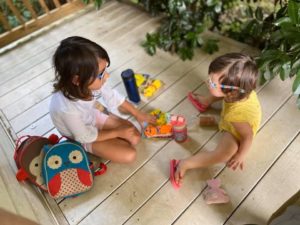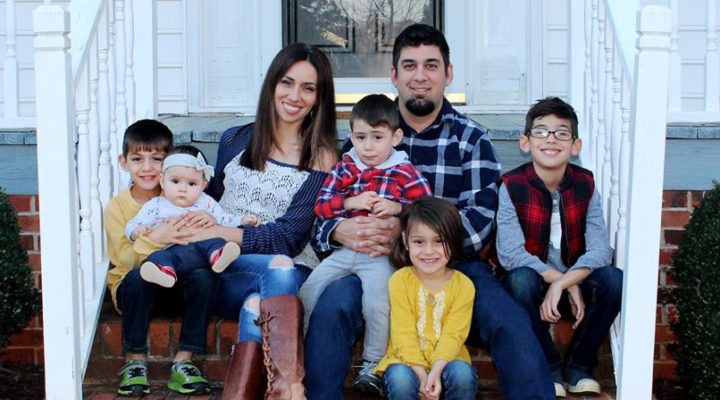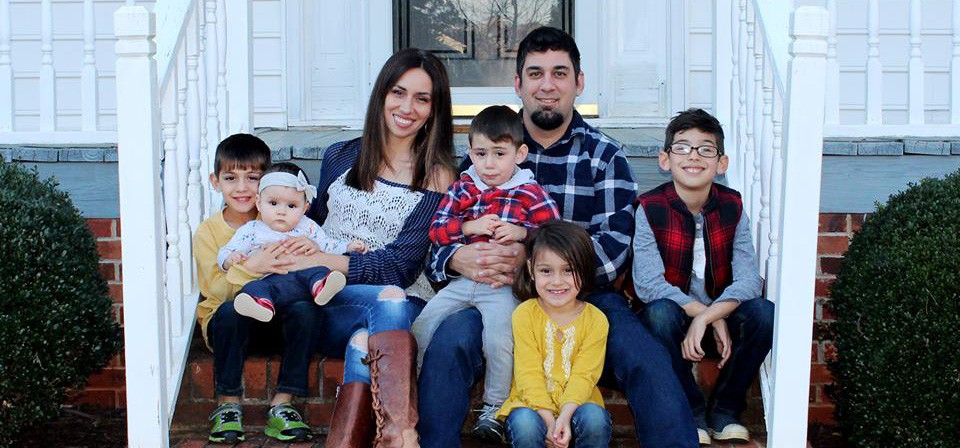I’m a stay-at-home dad for five kids under the age of 10. One of the most common responses to my recent piece about how John MacArthur doesn’t love his neighbor has been people attacking me for being a stay-at-home dad. Who am I as a stay-at-home dad to critique a seasoned pastor like MacArthur? One person even went so far as to tell me to “go wash the dishes and make me a sandwich.” I’ve already washed the dishes today. But a sandwich might be nice.
 These past six months of quarantine have been a beautiful and revealing time for me. As my daughter has commented a number of times, “In some ways, it’s kind of nice because we have each other and get to be together.” So I’d like to share five stories of connecting with my kids during this time, and then consider how holding to the theology of men like MacArthur would have affected our experiences of these moments.
These past six months of quarantine have been a beautiful and revealing time for me. As my daughter has commented a number of times, “In some ways, it’s kind of nice because we have each other and get to be together.” So I’d like to share five stories of connecting with my kids during this time, and then consider how holding to the theology of men like MacArthur would have affected our experiences of these moments.
Affirming their goodness
It was a beautiful sunny day as we went over to my parent’s house for our only pool party of the year. As you can imagine, my departure from conservative evangelicalism has caused relational stress with family. So whenever we go over there, my wounds feel fresh. During this year of COVID-19, we have only been over there twice. Each time, I am especially present to my wounds.
After the pool party was over, my mom asked my 10-year-old son, Blake, to help her throw the kids pool into the trash. He folded it up, carried it across the yard, and lifted it into the trash can all by himself.
As I observed this moment with my mom thanking him, I felt the emotions I carry both as a proud father of my son and as a child myself who wishes I could be affirmed for how I’ve parented my own kids. A simple act of my son throwing a pool away becomes a door to deep wonders and wounds. And for one small moment, it felt so good to watch my son help and receive the affirmation of my mom. At some spiritually quantum level, I could catch a glimpse of the three of us converging as relationships of energy.
Connecting with their wonder
 My 8-year-old son, Trevor, loves playing video games that allow him to create his own worlds. During quarantine, it has been easy to get stuck in the house and miss the world around us. And as an introvert, he could be content to stay inside. So we’ve had to get creative with our time together.
My 8-year-old son, Trevor, loves playing video games that allow him to create his own worlds. During quarantine, it has been easy to get stuck in the house and miss the world around us. And as an introvert, he could be content to stay inside. So we’ve had to get creative with our time together.
Often the most creative activities can be the simplest and most accessible. We’ve made a habit of taking walks together. He loves listening to the birds, feeling the breeze and resting in a lounge chair to watch the trees. During these times, he and I can connect with each other and with “Brother Sun, Sister Moon, Brothers Wind and Air, and Sister Water” at a mystical and contemplative level of deep stillness.
He may not even be aware of contemplative presence or of how the entire cosmos is energy in relationship at its core. But I can see him intuitively sensing his connection with creation.
Grieving their wounds
 My 6-year-old daughter, Aubrey, is usually a fireball. But the other day, she began to cry because she felt sick. After asking her what was wrong and if there was any way I could help her, I began to realize that she didn’t know and didn’t want any of my solutions. She simply wanted me to grieve with her. And so we sat together.
My 6-year-old daughter, Aubrey, is usually a fireball. But the other day, she began to cry because she felt sick. After asking her what was wrong and if there was any way I could help her, I began to realize that she didn’t know and didn’t want any of my solutions. She simply wanted me to grieve with her. And so we sat together.
As we simply sat with her grief, our hearts began to bond, and her body began to gain some strength. There was no need to point to anything beyond that moment. Sitting together in her grief was enough.
Learning their language
 As I was putting my 4-year-old son, Kilian, to bed one night, he said, “Daddy? Did you know I have a ghost inside of me?”
As I was putting my 4-year-old son, Kilian, to bed one night, he said, “Daddy? Did you know I have a ghost inside of me?”
“Oh really?” I asked. “Tell me more.”
He went on to explain that the ghost inside of him is what makes him alive, and that it figures out where the germs are inside of him in order to make sure he’s OK.
It’s so freeing to be able to learn your child’s language to discover how they are processing who they are in the world.
Being present
 My 2-year-old daughter, Eliana, laid on her back looking up into my eyes through the dim glow of her star lamp. I stroked her hair and sang, “Twinkle, Twinkle Little Star” as she gently smiled.
My 2-year-old daughter, Eliana, laid on her back looking up into my eyes through the dim glow of her star lamp. I stroked her hair and sang, “Twinkle, Twinkle Little Star” as she gently smiled.
Through her blanket, I could feel her two tiny feet cuddling with one another. Instantly our bond grew even more as I recognized how she was doing with her feet the same thing that I often do with mine. Little does she know. And for those few small moments, the infinite beauty of the entire cosmos was held between the two of us.
Is Christianity a religion or a relationship?
Relationships converge and grow through affirming, connecting, grieving, learning and being present. To move against that flow would be to cause a disconnect.
I often hear Christians say that Christianity is not a religion, but a relationship. I’d love for that to be the case. And in theory, I believe it can be. But if Christianity is a relationship, then its theology needs to resemble healthy relationships.
“The problem with American conservative evangelicalism, however, is that its theology in no way resembles healthy relationships.”
The problem with American conservative evangelicalism, however, is that its theology in no way resembles healthy relationships.
Rather than affirming our goodness, it sets our relationship with God on a merit system where God accepts us only if Jesus merits perfection and gets violently murdered in our place, and where even our goodness is worthy of eternal hell when we’re not actively thinking through a framework of faith. What kind of healthy relationship operates like that?
Rather than connecting with our wonder, it sets up a dualism where creation consists of separated individual entities and where we can’t connect with creation too much for fear of worshiping it. Its rampant embrace of young earth creationism fosters a hostility toward modern science. This disconnect with creation and mistrust of scientists, fueled by a fatalist view of the future of the earth, has led to a dismissal of creation care and is harming our planet. What kind of healthy relationship operates like that?
Rather than grieving our wounds, it instead forces us to think about our wounds within the “correct” framework of glorifying God and remembering that we actually deserve to be set on fire immediately forever. What kind of healthy relationship operates like that?
Rather than learning our languages, it is so overcome with fear of eternal conscious torment that it demands that we make sure everyone uses its correct terminology in order to escape the wrath of God. What kind of healthy relationship operates like that?
Rather than allowing us to be fully present now with each other, it forces us to have our minds set on someone else (Jesus), and in another time (either the cross or eternity). What kind of healthy relationship operates like that?
Retribution and disconnection
The relationships of American conservative evangelicalism are made possible through retribution. God will enter into a relationship with you only if God chooses to grant you the merits of Jesus where the Father got his anger all out by retributively crushing Jesus to death. But for the vast majority of us, God plans to torture us with retribution forever in hell. Again, what kind of healthy relationship operates like that?
“The degree to which we embrace what mainstream conservative evangelicalism says about the gospel is the degree to which we will be disconnected from ourselves and from one another.”
The degree to which we embrace what mainstream conservative evangelicalism says about the gospel is the degree to which we will be disconnected from ourselves and from one another. I couldn’t have fully embraced those moments during quarantine with my kids of affirming, connecting, grieving, learning and being present within the gospel framework I once held as truth. At some point, I either would have had to disconnect with that theology in order to continue converging in relationship with my kids, or I would have had to move on from my kids to some other formula, terminology or dimension.
We’re seeing the fruit of evangelicalism’s disconnection from self and neighbor during this season of COVID-19 and through their embrace of Donald Trump during this political season. Trump is the perfect candidate for them. He fits their theology of relationship based on merit and retribution well.
In my bio, I list my status as a stay-at-home dad as my first qualification precisely because I believe that the entire universe, and healthy Christianity, is relationship. I’ll never reach the masses with my message that men like MacArthur have reached with theirs. But I know what it’s like to affirm, connect, grieve, learn and be with my kids. So for me, in the convergence of the self and the other, I’m content to believe that God is there converging in relationship with us too.
 Rick Pidcock is a stay-at-home father of five kids. He and his wife, Ruth Ellen, have started Provoke Wonder, a collaboration of artists that exists to foster child-like worship through story and song. Provoke Wonder’s first album, Consider the Stars, was released in March 2020. Their first children’s book, What If, will be released in 2020. Rick is pursuing a master of arts degree in worship from Northern Seminary.
Rick Pidcock is a stay-at-home father of five kids. He and his wife, Ruth Ellen, have started Provoke Wonder, a collaboration of artists that exists to foster child-like worship through story and song. Provoke Wonder’s first album, Consider the Stars, was released in March 2020. Their first children’s book, What If, will be released in 2020. Rick is pursuing a master of arts degree in worship from Northern Seminary.
This story was made possible by gifts to the Mark Wingfield Fund for Interpretive Journalism.
Related articles:
My journey through purity culture and Christian worship music
In ‘Hamilton,’ King George has Calvin on his side


